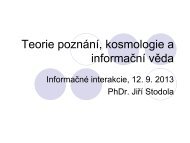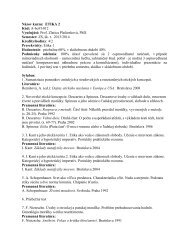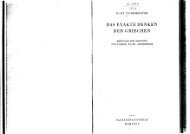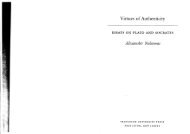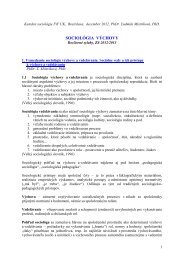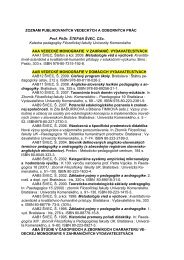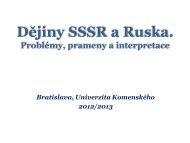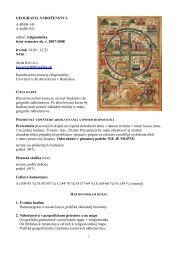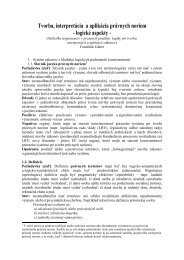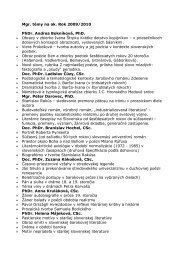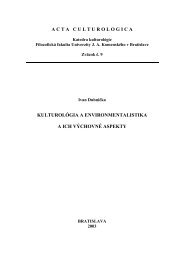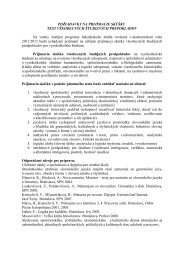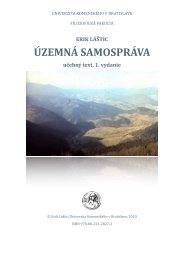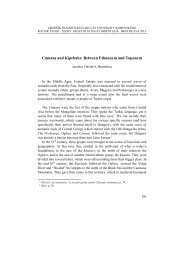Department of British and American Studies at the - Univerzita ...
Department of British and American Studies at the - Univerzita ...
Department of British and American Studies at the - Univerzita ...
Create successful ePaper yourself
Turn your PDF publications into a flip-book with our unique Google optimized e-Paper software.
At <strong>the</strong> same time, <strong>of</strong> course, this is <strong>the</strong> identity <strong>of</strong> <strong>the</strong> text composed <strong>of</strong> fragments <strong>of</strong><br />
texts <strong>and</strong> images <strong>and</strong> artefacts th<strong>at</strong> <strong>the</strong>mselves have <strong>the</strong>ir identity <strong>of</strong> separ<strong>at</strong>e contexts, carry<br />
both <strong>the</strong>ir own original contexts in terms <strong>of</strong> cultural history, as well as <strong>the</strong>ir own<br />
phenomenological <strong>and</strong> iconic quality – <strong>the</strong> identity <strong>of</strong> <strong>the</strong>ir original time <strong>and</strong> cultural<br />
perception <strong>and</strong> identity as defined by <strong>the</strong>ir reading or misreading over time <strong>and</strong> across<br />
cultures.<br />
Even though this is primarily an ontological poem, a poem <strong>of</strong> ontological strife – it is<br />
also irreducibly personal, <strong>at</strong> least to a degree. The strife <strong>of</strong> reassembling an identity via a very<br />
specific kind <strong>of</strong> archaeology <strong>of</strong> meaning actually integr<strong>at</strong>es cultural fragments – revived by<br />
personal rel<strong>at</strong>ion – with occasional references to a map <strong>of</strong> personal journeying <strong>and</strong> being, loci<br />
<strong>of</strong> personal myth <strong>and</strong> experience (especially Munich, <strong>the</strong> City <strong>of</strong> London, Marg<strong>at</strong>e, etc.). The<br />
purging process, scanning <strong>and</strong> refining <strong>the</strong> mental debris, in <strong>the</strong> same bre<strong>at</strong>h, stays very much<br />
in line with Eliot‘s personal <strong>and</strong> original concept <strong>of</strong> authorial appropri<strong>at</strong>ion as a way <strong>of</strong><br />
rejuven<strong>at</strong>ing <strong>the</strong> tradition, <strong>and</strong> thus remains also necessarily ―personal‖.<br />
As we have indic<strong>at</strong>ed, a major problem for <strong>the</strong> positive identific<strong>at</strong>ion <strong>of</strong> <strong>the</strong> poem‘s<br />
clearly defined field <strong>of</strong> identity is a rel<strong>at</strong>ivity <strong>of</strong> <strong>the</strong> voices‘ intent <strong>and</strong> tone. As we have hinted<br />
above, <strong>the</strong> working method <strong>of</strong> <strong>the</strong> poem is a kind <strong>of</strong> ―Shakespearian rag‖ (verse 128) – a kind<br />
<strong>of</strong> processing <strong>of</strong> samples <strong>of</strong> ―tunes‖ <strong>of</strong> works into different overall p<strong>at</strong>tern. But, as a result,<br />
partial expressions become rel<strong>at</strong>ive as <strong>the</strong> samples put toge<strong>the</strong>r correl<strong>at</strong>e differently in<br />
different mutual rel<strong>at</strong>ions. This new constell<strong>at</strong>ion produces a whole range <strong>of</strong> varieg<strong>at</strong>ed<br />
meaningful eman<strong>at</strong>ions <strong>and</strong> tensions, previously non-existent, which range from <strong>the</strong> grotesque<br />
to metaphysical, from <strong>the</strong> trivial to Wagnerian, <strong>and</strong> <strong>of</strong>ten subvert or rel<strong>at</strong>ivise <strong>the</strong> notion <strong>of</strong> <strong>the</strong><br />
very genres <strong>and</strong> genre identities <strong>the</strong>y origin<strong>at</strong>ed from.<br />
For instance, <strong>the</strong> voice <strong>of</strong> Madam Larisch here is no longer just safely set in its<br />
original context <strong>of</strong> her book <strong>of</strong> memories My Past, but plays out as a vocal counterpoint in <strong>the</strong><br />
oper<strong>at</strong>ic environment <strong>of</strong> Wagner‘s Tristan <strong>and</strong> Isolde, which itself is in a way conducted by<br />
a leading voice <strong>of</strong> The Ezekiel‘s comm<strong>and</strong> ―rise to thy feet, son <strong>of</strong> man‖, which is <strong>the</strong> ―voice<br />
from above‖. The divine <strong>and</strong> divining voice is <strong>of</strong> course possibly mocked <strong>and</strong> made mundane<br />
by l<strong>at</strong>er motifs <strong>of</strong> Ms. Porter, <strong>and</strong> o<strong>the</strong>r, but also developed in <strong>the</strong> gravely pious while<br />
possibly also jocular presence <strong>and</strong> voice <strong>of</strong> Madame Sosostris – a famous clairvoyant dealing<br />
<strong>and</strong> reading <strong>the</strong> Tarot ―pack <strong>of</strong> wicked cards‖, who cannot be <strong>at</strong>tached any particular historic<br />
identity but, perhaps, Madame Blav<strong>at</strong>sky or, equally possibly, Pharaoh Sesostris, one <strong>of</strong> <strong>the</strong><br />
gre<strong>at</strong>est military leaders Egypt ever had, who also was <strong>the</strong> one to introduce a cult <strong>of</strong> Serapis,<br />
a syncretic Hellenic Egyptian God. The effort <strong>of</strong> <strong>the</strong> poem is very much similar to cultural<br />
Slovak <strong>Studies</strong> in English, Vol. 3, 2011 – Identity in Intercultural Communic<strong>at</strong>ion<br />
196



